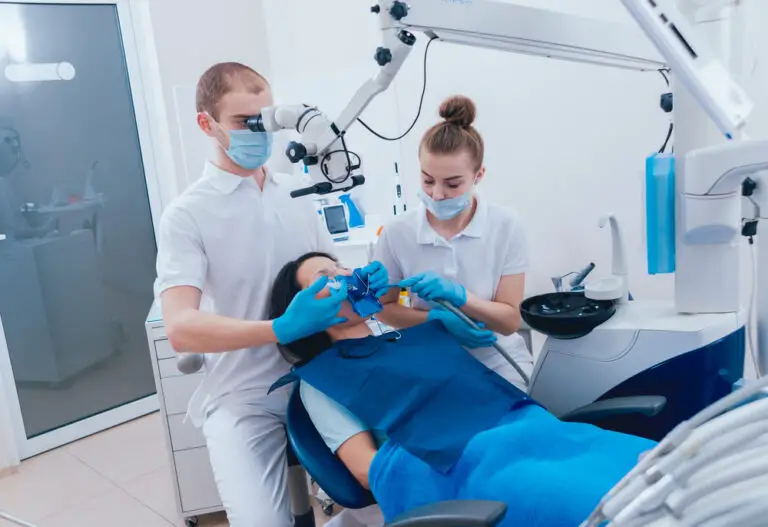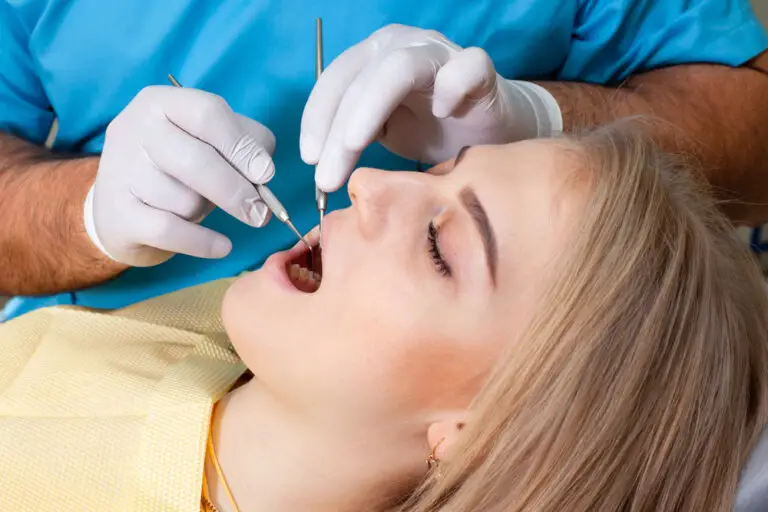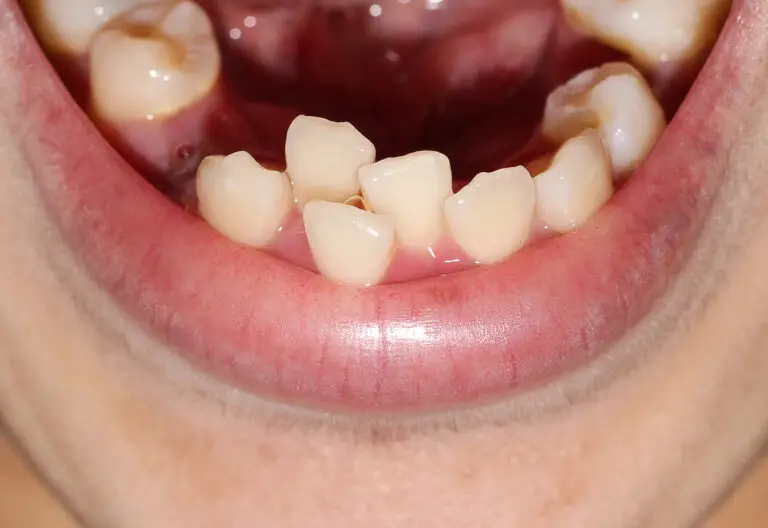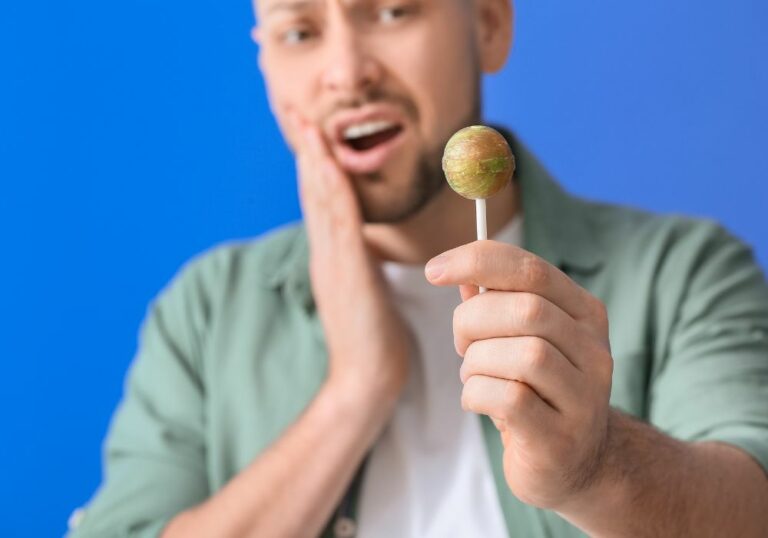What causes tooth sensitivity to pressure?
There are a number of potential reasons why you may feel pain or discomfort when pressure is applied to a tooth. The main causes include:
Dental caries (cavities)

Dental caries, also known as tooth decay, are one of the most common culprits of tooth sensitivity to pressure. Cavities form as a result of plaque buildup on the teeth. Plaque is a film composed of bacteria, food debris and saliva that sticks to the teeth if not removed regularly by brushing and flossing.
The bacteria in plaque thrive on consuming sugars and fermentable carbohydrates. As they metabolize these foods, the bacteria produce acids as a byproduct. These acids can erode and demineralize the hard enamel that protects the outer layer of teeth.
Once decay penetrates through the enamel and reaches the more porous dentin layer underneath, the process accelerates. The dentin has microscopic tubules that act as channels for the acids to seep deeper into the tooth interior. The acids then irritate and inflame the inner pulp tissue containing the tooth’s nerves and blood vessels.
As the decay spreads nearer the pulp and irritates the nerve, even mild pressure while chewing or biting can trigger sharp pain. The severity of the pain reflects the extent and depth of the decay. In early stages, discomfort may only occur when a specific spot is pressed. As the cavity enlarges, pain can become more constant and radiate through the whole tooth.
Dental fractures
Cracks, chips or fractures in a tooth can also elicit pain when pressure is applied during chewing. These fractures allow oral bacteria, fluids and debris to infiltrate down into the tooth layers, eventually irritating the living pulp tissue inside.
Vertical root fractures are often particularly painful, since the crack extends from the chewing surface down towards the root. Vertical fractures act as a pathway for bacteria and irritation to penetrate deep within the tooth. Any pressure placed on the tooth tends to elicit severe, sharp pain given how easily the fracture line exposes the internal pulp and nerves.
Dental abscesses
A dental abscess forms when a pocket of pus becomes trapped within and around the root of the tooth due to a bacterial infection. Abscesses commonly develop from advanced tooth decay or trauma that allows bacteria to infect the inner pulp tissue.
The pus builds up within the confined root canal space and the pressure increases inside the rigid tooth walls. This intensifying pressure on the nerve endings results in throbbing pain when any force is placed on the tooth. The pain is often severe enough to prevent sleep or normal eating. Abscesses require urgent dental treatment.
Advanced periodontal (gum) disease
Chronic gum infection, known as periodontitis, is another contributor to tooth sensitivity and pain when biting or chewing. Periodontitis causes progressive damage to the periodontal ligaments and alveolar bone that support and anchor the teeth in place. This leads to increasing tooth mobility over time.
As the ligament attachments and bone levels deteriorate, even a minor amount of pressure placed on the tooth while eating can elicit discomfort. The more loose the tooth has become, the more likely it is to hurt when touched or used for chewing. Extensive periodontal treatment is needed to halt the disease.
Bruxism
People who excessively grind their teeth (brux) or forcefully clench their jaws can place substantial pressure on the teeth. Over time, this can cause fractures, chipping damage, abfraction lesions, wearing down of the enamel, stretching of the periodontal ligament space, and chronic pain in the teeth when any pressure is applied while chewing. Bruxism often occurs during sleep without the person’s awareness. Wearing a custom dental night guard is recommended to prevent damage from nocturnal teeth grinding.
Prior dental treatments
It’s quite common for teeth to remain sensitive for a period of time after undergoing certain dental treatments. Common examples include the placement of fillings, crowns, bridges, veneers, dental implants, or after root canal therapy.
This temporary post-procedure sensitivity usually resolves on its own as the tooth adjusts to the restoration or completes the healing process after trauma from the dental work. But strong biting forces should still be avoided until sensitivity fully subsides.
Diagnosing the causes of tooth sensitivity to pressure
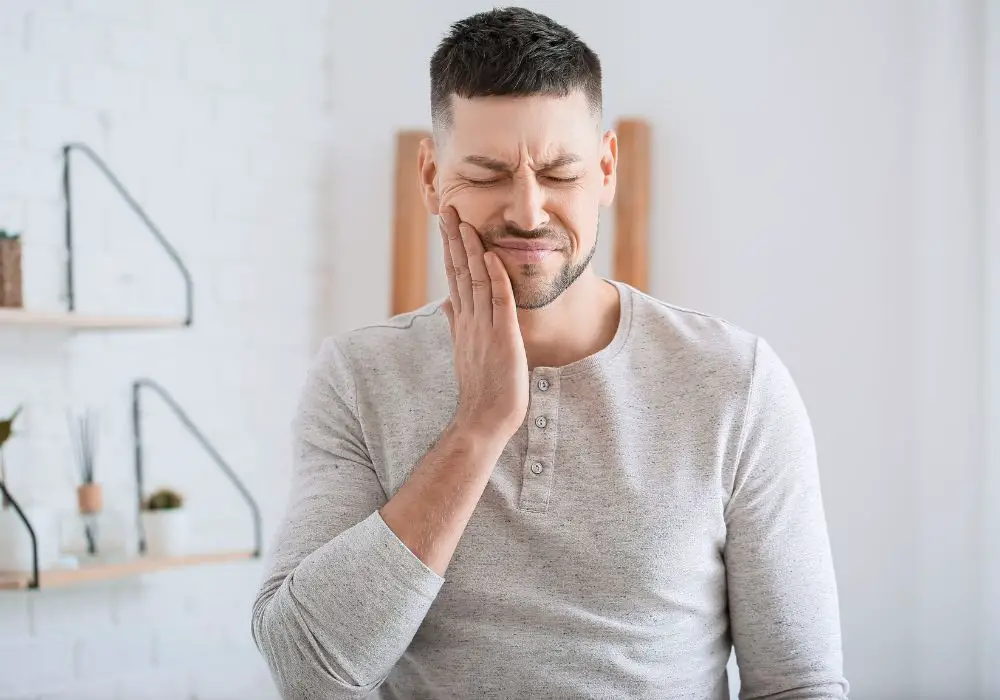
During your dental visit, your dentist will conduct a thorough evaluation to determine the reason behind your tooth pain and sensitivity when pressure is applied. Diagnostic steps include:
Medical and dental history review
Expect questions concerning:
- Type and location of pain
- Triggers like chewing, cold, heat, sweets
- Timing – when did it start, is it constant or intermittent
- Duration – has it been brief or long-standing
- Aggravating and relieving factors
- Prior dental treatments
- Symptoms like swelling, fever, or discharge
- Existing medical conditions and medications
Clinical examination
Your dentist will thoroughly examine the full mouth, looking for:
- Visible pitting, discoloration or cavities signaling decay
- Evidence of cracks, chips, abnormal wear, contributing to sensitivity
- Swelling, redness, enlarged gums indicating periodontal disease
- Loose teeth – a sign of advanced gum disease
- Missing restorations that may need replacement
They will also:
- Check for soft, demineralized spots on teeth using a dental probe
- Assess for pain response and pulp vitality by testing hot/cold sensitivity
- Evaluate how teeth fit and meet together – looking for problems like misalignment causing uneven wear or pressure
- Analyze gum recession and periodontal pocket depths
- Palpate the face and neck for swelling or lymph nodes
Dental imaging
X-rays allow visualization of underlying structural problems:
- Periapical x-rays – reveal decay, root fractures, bone loss near individual teeth
- Bitewing x-rays – detect interproximal decay between teeth
- Panoramic x-rays – scan all teeth plus jawbone and sinus cavities
Advanced diagnosis
Additional diagnostic testing can include:
- Pulp vitality testing – to check nerve health and signs of infection/inflammation
- Microbiological culture – to identify types of pathogenic oral bacteria involved
- Biopsy – for suspicious lesions to test for oral cancer
Once all findings have been assessed, your dentist will determine the definitive cause and optimal treatment plan specific to your situation.
Treatments for a tooth that hurts with pressure

The recommended treatments will depend on the diagnosed reason behind the tooth pain and sensitivity.
Treating dental caries
Based on the location and extent of decay, options include:
- Fillings – Removing decay and filling with composite resin or amalgam restorative materials
- Indirect inlays, onlays, crowns – Covering and protecting teeth with substantial loss of structure
- Root canal therapy – For deep decay reaching the pulp, the nerve tissue is removed and interior disinfected.
- Extraction – Non-restorable teeth may need extraction and replacement with bridge, implant, or denture
Correcting dental fractures
- Bonding – Small cracks and chips can often be restored with tooth-colored composite material
- Crowns – Covering the entire tooth is required for larger fractures or suspected vertical root cracks
- Root canal therapy – Cracked teeth frequently require root canal treatment as well to clear out inflamed or infected nerve tissue
- Extraction – Severe splits where the tooth cannot be saved may necessitate extraction
Treating abscesses
- Root canal therapy – Clears infection from canals and drains abscess; may require retreatment
- I&D – Incision and drainage of abscess through gum to release acute pus and pressure buildup
- Tooth extraction – Required when the tooth structure is too compromised by the infection to save
- Antibiotics – Prescribed to clear spreading infection once drainage is established
Addressing gum disease
- Professional dental cleanings – Supragingival and subgingival scaling to remove calculus
- Periodontal root planing – Smoothes root surfaces to clear diseased cementum
- Antimicrobial mouth rinses – Helps reduce levels of periodontal bacteria
- Periodontal flap surgery – Access for debridement and bone grafting in advanced disease
Managing bruxism
- Occlusal guard or night guard – Worn when sleeping to protect teeth from grinding forces
- Botox injections – Temporarily limits the muscles ability to forcefully clench
- Stress reduction techniques – Manage sources of anxiety or stress fueling bruxism habits
- Physical therapy – Stretches and exercises to relieve jaw muscle tension and spasms that exacerbate grinding
At-home remedies for tooth sensitivity
Before you can see a dentist, some self-care measures may help provide temporary relief:
- Cold compresses – Ice packs or cold compresses can numb nerve sensitivity in the area
- OTC pain medication – Anti-inflammatories like ibuprofen/naproxen sodium help alleviate discomfort
- Salt water rinse – Swish with a warm saltwater rinse to draw out infection and reduce inflammation
- Dental wax – Apply wax over a fractured spot to minimize sensitivity from air/food exposure
- Soft foods diet – Stick to soft, lukewarm foods, avoiding hard, crunchy items that put pressure on the tooth
- Proper oral hygiene – Gentle flossing and brushing to keep plaque controlled and prevent more decay
- Stress relief – Use relaxation techniques to avoid clenching/grinding that can damage teeth
- Night guard – Wear an over-the-counter dental guard to protect teeth from bruxism while sleeping
However, these are temporary measures only until a dentist can provide definitive treatment. Don’t delay scheduling an appointment.
When to seek emergency dental treatment

Despite trying at-home care, you should seek emergency dental attention if you have:
- Constant, severe, throbbing toothache preventing sleep or eating
- Tooth that is extremely sensitive to hot/cold temperatures
- Major swelling in your face, neck, cheeks or gums
- Fever suggesting a spreading infection
- Pus discharge from your gums
- Chipped or broken tooth with visible pulp exposure
- Loose tooth that has changed position and exhibits pain
- Trauma causing lost, displaced or knocked-out tooth
Any of these urgent symptoms indicate the need for immediate emergency dental treatment to address serious issues like a dental abscess, advanced decay, or fracture. Prompt care helps avoid additional complications.
Frequently asked questions
Why does my tooth only hurt when biting down but not otherwise?
Pain isolated to biting pressure suggests a cracked tooth, fracture, or abscess buildup inside the tooth. Biting applies extra forces onto existing cracks or areas of decay, aggravating the inflamed nerve and pulp tissue to elicit pain.
What does it mean if my tooth hurts to touch but not to temperature?
Sensitivity to hot/cold drinks relates more to exposed dentin and nerve fibers. Discomfort when directly touching or pressing on a tooth typically indicates issues with the tooth structure itself – namely tooth decay, fracture, bruxism, or abscess needing evaluation.
Is some sensitivity to pressure normal after a new filling?
Mild sensitivity when chewing or biting can be common after a new filling, as the tooth adjusts to the restored area. But moderate to severe pain is not normal and may signal that the filling procedure has irritated the nerve or pulp tissue. Contact your dentist immediately in that case.
How can I temporarily relieve pressure sensitivity before my dental visit?
Use saltwater rinses, ice packs, OTC pain medication, dental wax on the area, a soft foods diet, and avoid chewing on the tooth. But these provide only temporary relief until the cause can be properly diagnosed and treated.
What are the worst case causes of severe pain with pressure?
Advanced tooth decay penetrating deep to the pulp, long-standing untreated abscesses, severe tooth fractures involving the pulp, advanced periodontal disease with severely loose teeth, and split teeth are some worst case scenarios that can cause severe pressure pain and require urgent dental care.
Conclusion
In summary, sensitivity or pain when pressure is applied to a tooth can stem from issues like tooth decay, fractures, abscesses, bruxism, gum disease or recent dental work. While home care like cold compresses and OTC pain medication may provide temporary relief, it’s crucial to promptly seek professional diagnosis and treatment. Catching problems early on while they are still reversible leads to simpler, more conservative solutions. Allowing them to progress risks tooth loss, infection spread, and more complex procedures. See your dentist right away if your tooth hurts when you bite down or chew to determine the cause and implement the appropriate remedy. This will help preserve your natural teeth and your smile for the long term.

